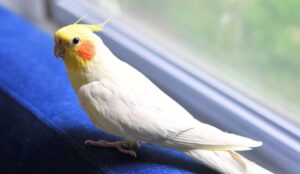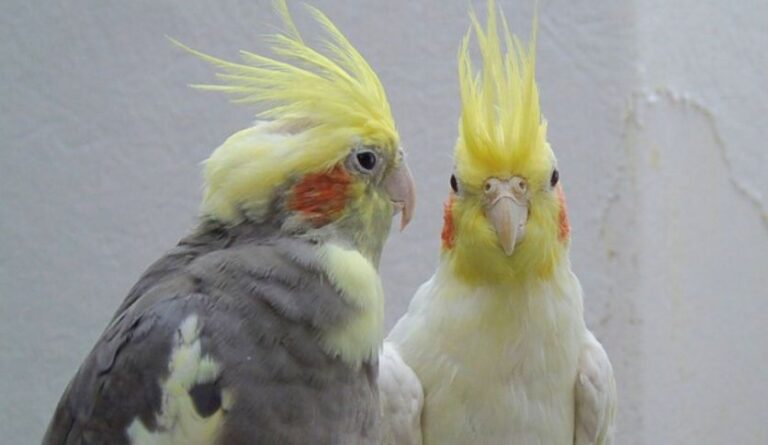Your cockatiel might shake due to stress, fear, illness, or cold temperature. Cockatiels are beloved pet birds known for their vibrant feathers, playful nature, and distinct crest.
However, as a responsible pet owner, you must be attentive to your cockatiel’s unusual behavior. One such behavior that may cause concern is when your cockatiel starts shaking. Shaking in cockatiels can be alarming, but it’s crucial to understand the possible reasons behind it.
This article will delve into the various factors that could contribute to a shaking cockatiel, including stress, fear, illness, and cold temperature. By identifying the cause, you’ll be better equipped to take appropriate action and ensure the well-being of your feathery friend. Let’s explore the potential causes and solutions for a shaking cockatiel.
Understanding Cockatiel Shivering
| Reason | Description |
| Anxiety or fear | Shaking may indicate that your cockatiel is feeling anxious or scared. New surroundings, loud noises, or sudden environmental changes can trigger this. |
| Cold temperature | Like humans, birds can shiver when they are cold. Ensure that your cockatiel’s cage is warm and draft-free to prevent shivering caused by chilly temperatures. |
| Illness or pain | Shivering can be a symptom of an underlying health issue or pain. If your cockatiel’s shaking is accompanied by other signs of illness, such as loss of appetite or changes in behavior, it’s important to consult a veterinarian. |
| Excitement | Sometimes, cockatiels may shake due to excitement or anticipation. This can occur when they are eagerly awaiting a treat, a favorite toy, or when they are about to engage in playtime with their owner. |
Observing your cockatiel’s behavior is important in understanding their well-being. It is crucial to recognize normal versus abnormal shivering. While occasional shaking may be harmless, persistent or severe trembling could indicate a more serious issue. It’s always best to monitor your cockatiel closely and consult a professional if you have any concerns.
Health Issues That Cause Shivering In Cockatiels

Shivering in cockatiels can cause concern, as it can indicate underlying health issues. It is important to link this behavior with common cockatiel illnesses like respiratory problems and hypothermia.
One possible cause of shivering is respiratory problems. Cockatiels are susceptible to respiratory infections, and symptoms may include shivering. Other signs to watch include sneezing, coughing, wheezing, and difficulty breathing. If you notice any of these symptoms, it is crucial to consult a veterinarian for a proper diagnosis and treatment.
Hypothermia can also cause shivering in cockatiels. These birds are native to warmer climates and can experience discomfort in cold temperatures. Ensure your cockatiel’s environment is kept at a suitable temperature, and provide additional warmth if needed, such as heating pads or covers.
It is important to monitor your cockatiel closely and seek medical attention if you notice any prolonged or severe shivering. Early detection and proper care are key to ensuring your feathered friend’s health and well-being.
Environmental Factors That Impact Cockatiel Shivering
Assessing the temperature and humidity levels in your cockatiel’s habitat is crucial in understanding why your cockatiel may be shaking. Cockatiels are sensitive to temperature changes, and extreme variations can significantly impact their well-being. Drafts and sudden temperature changes can cause them to shiver to regulate their body temperature. It is essential to ensure that your cockatiel’s habitat is at a comfortable temperature and protected from drafts.
Furthermore, stressful situations can also contribute to cockatiel shivering. Identifying and minimizing stressors in your cockatiel’s environment is important for their health. Factors such as loud noises, sudden movements, or unfamiliar surroundings can induce stress and shivering in cockatiels. Providing a calm and predictable environment, regular socialization, and mental stimulation can help alleviate these stressors.
Stress And Emotional Factors In Cockatiel Shivering
Shaking in cockatiels can be caused by various factors, including stress and emotional distress. One possible cause is a new environment or routine changes, which can significantly impact your feathered friend. Cockatiels are sensitive creatures and may display signs of fear, anxiety, or other emotional distress when faced with these changes. It is important to recognize these signs and take steps to minimize stress and promote a calm environment for your pet.
To help your cockatiel adjust to a new environment, give them plenty of hiding spots and familiar objects from their previous space. Gradually introduce them to new sights, sounds, and smells. Additionally, maintaining a consistent routine can help reduce stress. Establish a feeding and play schedule that your cockatiel can rely on.
Creating a peaceful environment is key to keeping your cockatiel happy and healthy. Avoid loud noises, sudden movements, and stressful situations. Provide your bird with stimulating toys and activities to alleviate boredom. Regular social interaction and positive reinforcement can also help build trust and confidence.
Nutrition And Diet As Possible Causes Of Cockatiel Shivering
Understanding the importance of a balanced diet for cockatiels’ overall health: Cockatiels require a well-rounded diet to thrive, and a lack of necessary nutrients can contribute to shivering. Incorporating various foods, including high-quality pellets, fresh fruits and vegetables, and occasional seeds, ensures your bird receives the necessary vitamins, minerals, and proteins. Identifying nutrient deficiencies and their effect on a cockatiel’s well-being: Certain deficiencies, such as calcium or vitamin D, can lead to tremors and shivering in cockatiels. Consult an avian veterinarian to identify and address nutrient gaps in your pet’s diet. Tips for providing a healthy and varied diet to prevent shivering: Offer a wide array of fruits, vegetables, and pellets, ensuring a colorful mix of options to maintain optimal health. Gradually introduce new foods and observe your cockatiel’s preference for different textures and flavors. Rotate foods regularly to prevent boredom and encourage the consumption of essential nutrients.
Seeking Professional Help For Shivering Cockatiels
When your cockatiel is shaking, it may be time to consult a veterinarian. The shivering can be a sign of an underlying health issue that requires proper diagnosis and treatment. Seeking professional help is crucial to ensure the well-being of your beloved pet.
A veterinarian will perform various diagnostic tests and procedures to determine why your cockatiel is shivering. These may include physical examination, blood tests, and imaging studies. These tests will help identify any underlying health conditions that might be causing the shivering.
Once the underlying cause is determined, the veterinarian will discuss the appropriate treatment options for your cockatiel. The treatment plan will depend on the specific health condition causing the shivering. This could involve medications, changes in diet, environmental modifications, or other interventions to alleviate the shivering and improve your bird’s overall health.
Frequently Asked Questions For Why Is My Cockatiel Shaking
Is It Normal For My Cockatiel To Shake?
Yes, it is normal for a cockatiel to shake. Shaking can indicate different things, such as being excited, scared, or trying to dry off after bathing. Make sure your cockatiel has a comfortable and safe environment. Monitor the shaking to ensure it doesn’t persist or worsen, which may require veterinary attention.
Why Is My Bird Shaking?
Birds may shake for various reasons, such as cold, excitement, fear, or illness. It’s important to observe their behavior and surroundings to determine the cause. If the shaking persists or is accompanied by other concerns, consult a veterinarian for further evaluation and guidance.
Why Is My Cockatiel Twitching?
Cockatiels may twitch due to stress, illness, or external factors like drafts or loud noises. It’s important to keep their environment calm, comfortable, and free from potential stressors. If the twitching persists or is accompanied by other symptoms, consult a veterinarian for a proper diagnosis and treatment.
Why Is My Cockatiel Puffed Up And Shaking?
A puffed-up and shaking cockatiel could indicate illness, stress, or cold temperatures. It’s important to monitor your pet’s behavior and surroundings to ensure their well-being. If the behavior persists or worsens, consult a veterinarian for proper diagnosis and treatment.
Conclusion
If you notice your cockatiel shaking, it is important to monitor their behavior and seek veterinary assistance if necessary. Shaking can be a sign of various underlying health issues or stress. By providing a comfortable environment, a balanced diet, and regular check-ups, you can ensure the well-being of your beloved pet.
Remember, understanding and addressing their needs can contribute to their overall health and happiness.

Hi, I’m Regina Rios. Just another bird lover who loves to share knowledge from personal experience. I’ve grown up with pet birds since childhood as my mommy also loves birds. As I can’t pet many birds in open air in my house as my mom does; I created my first bird cage on my rooftop using wood, copper wire, and a metal shed in 2018 and start collecting pet birds. Now, I have so many pet birds such as Macaws, Parrot, Cockatiel, Parakeet, and others. Not only that, if I see natural birds are injured I keep them in my house until they get well. Now, my hobby becomes my income source as my home birds have babies and I sell them to birds lover like mine. I’ve created this blog to inspire others bird owners by sharing my personal knowledge. Good Luck!


